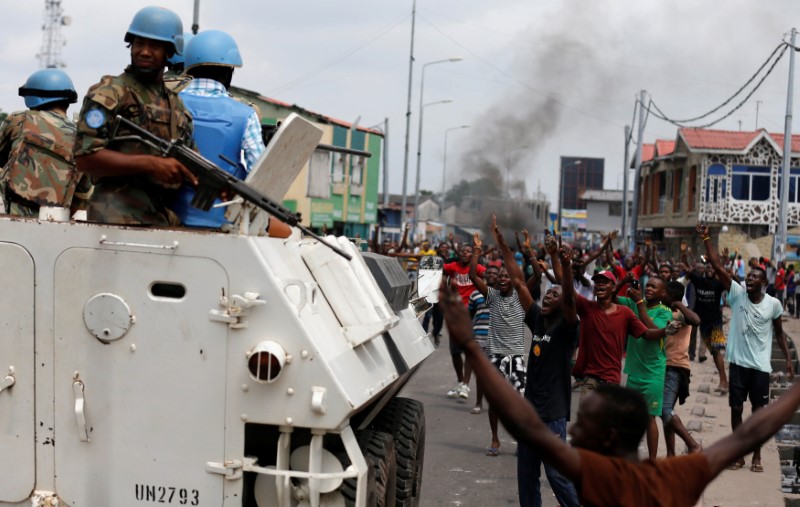By Aaron Ross and Tim Cocks
KINSHASA (Reuters) - Police said they had arrested 275 people across Democratic Republic of Congo as two days of protests against President Joseph Kabila appeared to subside on Wednesday.
Sporadic gunfire rang out over the capital and witnesses reported clashes in the southeastern mining hub of Lubumbashi, but nothing on the scale of the violence when youths took to the streets on Tuesday accusing Kabila of trying to cling to power.
Police said 21 civilians and one officer had been killed in the protests that erupted as Kabila's mandate expired without any elections in place to pick a successor. Rights groups earlier gave higher death tolls.
Kabila and his supporters have denied any plan to stay in power and said elections were delayed by logistical problems.
But African and Western powers fear the political crisis could spiral into broader conflict, risking a repeat of the 1996-2003 wars in this vast, chaotic country that killed millions and drew in the armies of half a dozen neighboring states.
Police spokesman Colonel Pierre Mwanamputu said most of the dead civilians had been hit by stray bullets or shot while looting over Tuesday and Wednesday.
"The heavy security presence will remain in place until the end of the year," he added.
On Wednesday security forces repressed protests in Lubumbashi that left 10 dead and 47 wounded, King Kasongo, a lawyer and activist for the NGO Humanism and Human Rights (HDH), said.
Crowds also wounded a policeman and attacked government offices, health centers and gas stations, he told Reuters.
Human Rights Watch (HRW) earlier said that at least 26 people were killed across Congo, including one in Lubumbashi, though it had yet to provide a final tally. The director of the United Nations human rights office in Congo, Jose Maria Aranaz, said he had confirmed 19 deaths with 45 wounded.
CHURCH LEADS TALKS
As an uneasy calm returned, some Kinshasa residents ventured from their homes on Wednesday, but the city's normally hectic traffic had slowed and buses were limited.
Authorities arrested 20 members of the activist group LUCHA for sitting in front of the office of the governor of North Kivu province in the city of Goma, the group said on Twitter.
The main opposition bloc showed up to the resumption of talks mediated by Congo's Roman Catholic bishops, but Jean Marc Kabund, the leader of one of the parties in the bloc, the UDPS, told reporters he was only there to insist on Kabila quitting.
The church has assumed the responsibility of trying to prevent the crisis spinning out of control.
"Those of you with political responsibility, listen to the voice of your own conscience, recognize the cruel suffering of your people and take to heart the common good," Pope Francis told his weekly audience on Wednesday, addressing Congo leaders.
"They should go to dialogue to find a solution," said Maggie Munanango, selling peanuts in a Kinshasa market.
Democratic Republic of Congo, Africa's biggest miner of copper and metals used in gadgets such as cobalt, has not known a peaceful transition of power since independence from Belgium in 1960. Armed groups have repeatedly clashed over Congo's land and mineral wealth and used mass rape as a strategic weapon.
Separately, clashes between police and a militia led by a Christian pastor in northwest Mongala province killed 15 militiamen and three policemen on Tuesday, the former deputy commissioner of Mongala Michael Sakombi said.

The clashes were not linked to the wider politics, but they underscored how easily armed conflict can erupt.